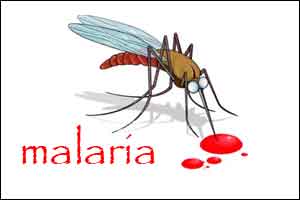- Home
- Editorial
- News
- Practice Guidelines
- Anesthesiology Guidelines
- Cancer Guidelines
- Cardiac Sciences Guidelines
- Critical Care Guidelines
- Dentistry Guidelines
- Dermatology Guidelines
- Diabetes and Endo Guidelines
- Diagnostics Guidelines
- ENT Guidelines
- Featured Practice Guidelines
- Gastroenterology Guidelines
- Geriatrics Guidelines
- Medicine Guidelines
- Nephrology Guidelines
- Neurosciences Guidelines
- Obs and Gynae Guidelines
- Ophthalmology Guidelines
- Orthopaedics Guidelines
- Paediatrics Guidelines
- Psychiatry Guidelines
- Pulmonology Guidelines
- Radiology Guidelines
- Surgery Guidelines
- Urology Guidelines
Toothpaste ingredient can help fight drug-resistant malaria: Research

An ingredient commonly found in toothpaste could be employed as an anti-malarial drug against strains of the malaria parasite that have grown resistant to one of the currently used drugs. This discovery, led by researchers at the University of Cambridge, was aided by Eve, an artificially-intelligent 'robot scientist'.
When a mosquito infected with malaria parasites bites someone, it transfers the parasites into their bloodstream via its saliva. These parasites work their way into the liver, where they mature and reproduce. After a few days, the parasites leave the liver and hijack red blood cells, where they continue to multiply, spreading around the body and causing symptoms, including potentially life-threatening complications.
Malaria kills over half a million people each year, predominantly in Africa and south-east Asia. While a number of medicines are used to treat the disease, malaria parasites are growing increasingly resistant to these drugs, raising the spectre of untreatable malaria in the future.
Now, in a study published in the journal Scientific Reports, a team of researchers employed the Robot Scientist 'Eve' in a high-throughput screen and discovered that triclosan, an ingredient found in many toothpastes, may help the fight against drug-resistance.
When used in toothpaste, triclosan prevents the build-up of plaque bacteria by inhibiting the action of an enzyme known as enoyl reductase (ENR), which is involved in the production of fatty acids.
Scientists have known for some time that triclosan also inhibits the growth in culture of the malaria parasite Plasmodium during the blood-stage, and assumed that this was because it was targeting ENR, which is found in the liver. However, subsequent work showed that improving triclosan's ability to target ENR had no effect on parasite growth in the blood.
Working with 'Eve', the research team discovered that in fact, triclosan affects parasite growth by specifically inhibiting an entirely different enzyme of the malaria parasite, called DHFR. DHFR is the target of a well-established antimalarial drug, pyrimethamine; however, resistance to the drug among malaria parasites is common, particularly in Africa. The Cambridge team showed that triclosan was able to target and act on this enzyme even in pyrimethamine-resistant parasites.
"Drug-resistant malaria is becoming an increasingly significant threat in Africa and south-east Asia, and our medicine chest of effective treatments is slowly depleting," says Professor Steve Oliver from the Cambridge Systems Biology Centre and the Department of Biochemistry at the University of Cambridge. "The search for new medicines is becoming increasingly urgent."
Because triclosan inhibits both ENR and DHFR, the researchers say it may be possible to target the parasite at both the liver stage and the later blood stage.
Lead author Dr Elizabeth Bilsland, now an assistant professor at the University of Campinas, Brazil, adds: "The discovery by our robot 'colleague' Eve that triclosan is effective against malaria targets offers hope that we may be able to use it to develop a new drug. We know it is a safe compound, and its ability to target two points in the malaria parasite's lifecycle means the parasite will find it difficult to evolve resistance."
Robot scientist Eve was developed by a team of scientists at the Universities of Manchester, Aberystwyth, and Cambridge to automate - and hence speed up - the drug discovery process by automatically developing and testing hypotheses to explain observations, run experiments using laboratory robotics, interpret the results to amend their hypotheses, and then repeat the cycle, automating high-throughput hypothesis-led research.
Professor Ross King from the Manchester Institute of Biotechnology at the University of Manchester, who led the development of Eve, says: "Artificial intelligence and machine learning enables us to create automated scientists that do not just take a 'brute force' approach, but rather take an intelligent approach to science. This could greatly speed up the drug discovery progress and potentially reap huge rewards."

Disclaimer: This site is primarily intended for healthcare professionals. Any content/information on this website does not replace the advice of medical and/or health professionals and should not be construed as medical/diagnostic advice/endorsement or prescription. Use of this site is subject to our terms of use, privacy policy, advertisement policy. © 2020 Minerva Medical Treatment Pvt Ltd